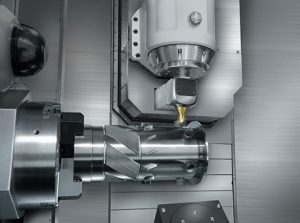CAM support for additive DED manufacturing with DP Technology
-

- Tweet
- Pin It
- Condividi per email
-

The DP Technology announces the first commercial version of the company’s Esprit CAM system that includes additive direct energy deposition (DED) cycles.
Esprit’s additive capabilities are the product of the team’s more than 35 years of experience in toolpath generations, and they include the same intuitive user interface that users expect from the software. The product release includes 3-axis, 4-axis, and 5-axis DED support, and DP Technology is working closely with some of the world’s leading machine manufacturers to validate their brand-new additive cycles. Combined with the subtractive processes and embedded into a single software, the enhanced CAM solution brings a full spectrum of support to hybrid manufacturing.
As one of the main additive manufacturing processes, directed energy deposition (DED) uses a focused energy source, such as a laser or electron beam, to melt the material. The ability to control the grain structure of a part makes DED a good solution for the repair of functional metal parts. For example, DED is often applied to rebuild large, expensive, and high-wear components for aerospace, energy, or marine industries, such as turbine blades, drill heads, or propellers. DED is also one of the few metal 3D printing technologies suitable for integration into CNC machines to create a hybrid manufacturing solution. By mounting a deposition nozzle on a multi-axis machining system, highly complex metal parts can be produced faster and with increased flexibility.
The new additive DED cycle offers users a full-spectrum additive solution, from CAD file to finished part, including additive simulation and verification, as well as global support from Esprit’s technical teams. DP Technology validated their post processor through collaboration with major machine manufacturers and educational institutions, working for more than a decade on additive manufacturing, including research on DED toolpath trajectories and AM thermal simulation. Esprit’s additive DED solution is the result of the close collaboration between the company and Grenoble University, a world’s leading research institution on additive DED technology.
Contenuti correlati
Scopri le novità scelte per te x
Economy read all ▶
-
Simulation in motorsport for Peugeot Sport hypercar with Dassault Systèmes
Dassault Systèmes and Peugeot Sport, the motorsports division of Stellantis, announced their partnership to...
-
RF rotary joints, Servotecnica signs agreement with Diamond Antenna
Servotecnica announces the agreement signed with the US company Diamond Antenna, supplier of world-class...
-
New advanced robotics hub for Universal Robots and MiR in Denmark
Universal Robots, the Danish collaborative robot (cobot) company, and Mobile Industrial Robots (MiR), the...
Technology read all ▶
-
Two-stage pressure regulator Emerson for hydrogen-powered vehicles
Emerson has introduced a new two-stage pressure-reducing regulator intended to maximise efficiency and improve...
-
High payload vertical articulated robot Mitsubishi Electric
Mitsubishi Electric has launched the Melfa RV-12CRL vertical articulated robot, which offers 1,504 mm...
-
Highly reliable pressure sensor Parker Hannifin for hydraulic applications
Parker Hannifin has introduced the SCP09 pressure sensor, a versatile and reliable solution for...








